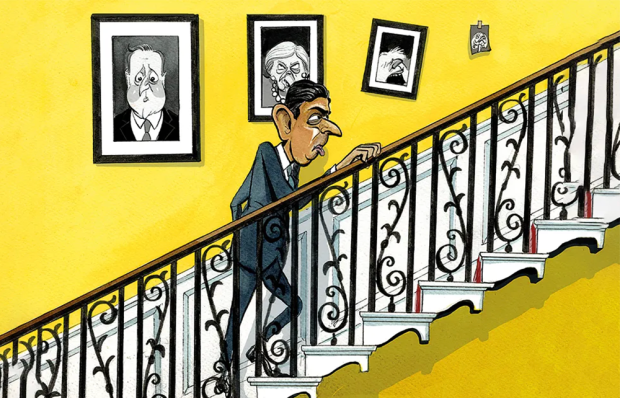Conservative party strategists face nervous days ahead as they wait to see how many Tory MPs will announce they are standing down at the next election. The last two general elections – 2017 and 2019 – were called unexpectedly in the middle of parliament, meaning MPs had next to no time to decide whether or not they were going to stand. This time, with no real prospect of a snap election before 2024, a dozen Tory MPs have already said they won’t fight the next general election. It would be a surprise if more didn’t join them in the coming days, although the mass departures that were predicted a few weeks ago have not yet come to pass ahead of Monday’s deadline.
The MPs who choose not to stand in 2024 will cause a headache for Conservative Campaign Headquarters because the party will have less of an incumbency advantage in these seats. A popular local MP can be worth a few thousand votes, which can be vital in a tight election. In 2015, the Tories particularly benefitted from the name recognition and job approval of those elected for the first time in 2010. It also means that, for the next two years, the MPs who have announced they are standing down will be more difficult to whip.
One of the striking things about the Tory retirees is how young some of them are. Their average age is below 50, which is 20 years younger than their Labour equivalents. Chloe Smith, the former welfare secretary, was just 27 when she won her seat in a by-election in 2009, which made her the youngest MP in the House at the time. She is retiring, having fought the seat five times, had children during her time as an MP, survived breast cancer and served in five ministerial jobs.
Dehenna Davison, the MP for Bishop Auckland and one of the signature Tory gains of 2019, has announced her political retirement before her 30th birthday. What makes Davison’s decision all the more remarkable is that she is currently a minister. Normally someone who becomes a minister in their twenties wouldn’t contemplate retirement, given their rapid progression. But when Davison explained why she was standing down, she said that because of politics she hadn’t led a ‘normal life for a twentysomething’.
It’s hard to get around the fact that any Tory in a competitive seat knows they have a fight on their hands, and the past 12 years in politics have contained enough drama to fill several decades, let alone years. Indeed, a Tory first elected in 2010 has campaigned in four general elections, two referendums and four Tory leadership contests. This constant level of activity is draining and explains why some MPs want to walk away. One of those who is standing down told me that they were going because they were ‘just exhausted’.
Then there is the sheer level of ministerial churn of the past few years. Remarkably, more than half of Tory backbenchers have previously served as ministers. Once people have been a minister, they are more inclined to view their political careers as done. The more stringent attitude to second jobs also means that former ministers are less inclined to stay on than they once were – although it should equally be noted that there are three former prime ministers in the House of Commons.
Another factor pushing people towards retirement is the pressures of the job. There is the tragic fact that two MPs have been murdered in recent years while carrying out constituency duties. MPs say that online abuse feels more direct and personal than the green ink letters of years gone by. The Victorian novelist Anthony Trollope once said: ‘It is the highest and most legitimate pride of an Englishman to have the letters MP written after his name. No selection from the alphabet, no doctorship, no fellowship, be it of ever so learned or royal a society, no knightship – not though it be of the Garter – confers so fair an honour.’ His words do not find much favour these days.
These early retirements suggest that political careers these days move quickly. Take Matt Hancock. He was George Osborne’s chief of staff when the Tories were in opposition and was elected to a safe Tory seat in 2010, aged just 31. Two years later, he was made a minister and succeeded to cabinet before his 40th birthday. Ye, before he has even reached the age of 45 he has appeared on a reality TV show, trying to turn himself into some kind of national treasure.
Knowing Hancock, it would be foolish to conclude that he thinks his career is over: he is far too politically ambitious for that. But it is easier to imagine him coming back in some extra-parliamentary role than attempting to climb the Westminster greasy pole again. Indeed, one of the changes of the past few years is that you no longer have to be in parliament to have political influence. Andy Burnham, for instance, left the Commons five years ago but has arguably had as much effect as any other Labour figure in that time in his role as Mayor of Greater Manchester. If Hancock is going to attempt to return to the political front line – and given his high embarrassment threshold and his sheer determination to be involved this seems probable – his most likely route would be the Tory nomination for Mayor of London.
It is easy to say that the attrition rate of modern politics is nothing to worry about. After all, there are undoubtedly far more people who want to be MPs than there are vacancies. But this loss of experience is a problem. The Commons works best when there is knowledge on both the front and the back benches.
The post Why Tories are taking early retirement appeared first on The Spectator.
Got something to add? Join the discussion and comment below.
Get 10 issues for just $10
Subscribe to The Spectator Australia today for the next 10 magazine issues, plus full online access, for just $10.
You might disagree with half of it, but you’ll enjoy reading all of it. Try your first month for free, then just $2 a week for the remainder of your first year.















Comments
Don't miss out
Join the conversation with other Spectator Australia readers. Subscribe to leave a comment.
SUBSCRIBEAlready a subscriber? Log in